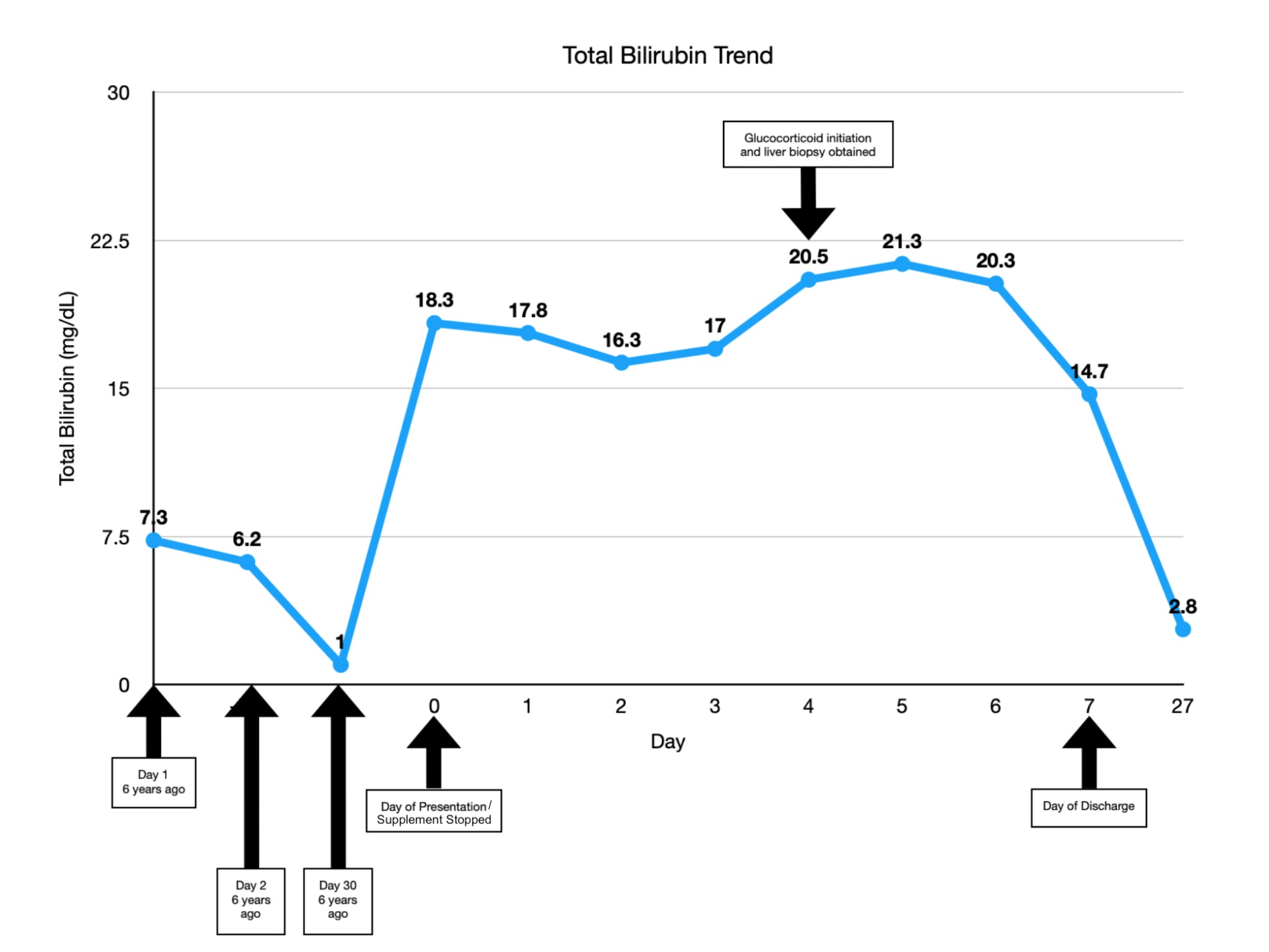Monday Poster Session
Category: Liver
P3933 - Recurrent Drug-Induced Autoimmune Hepatitis Due to Turmeric
Monday, October 27, 2025
10:30 AM - 4:00 PM PDT
Location: Exhibit Hall

Arti Patel, MD
Eisenhower Medical Center
Rancho Mirage, CA
Presenting Author(s)
Arti Patel, MD, Karina Dargan, MD, Paul Formaker, DO, Christopher Romberg, MD
Eisenhower Medical Center, Rancho Mirage, CA
Introduction: Drug-induced autoimmune hepatitis (DIAIH) accounts for 2-18% of autoimmune hepatitis (AIH) cases and 2.9-8.8% of drug-induced liver injuries (DILI). DIAIH is associated with antibiotics, statins, immunotherapy, and rarely herbal supplements (HDS). Distinguishing DIAIH from AIH is challenging but features of acute onset, temporal relationship with drug initiation, improvement after drug cessation with or without glucocorticoid treatment, absence of cirrhosis, and no personal or family history of autoimmune disease can support its diagnosis. Piperine (black pepper), added to turmeric supplements to enhance the bioavailability of curcumin, the active ingredient, potentiates liver injury. We present a case of recurrent turmeric-induced DIAIH with more severe injury on re-exposure.
Case Description/
Methods: A 65-year-old female with presumed supplement-induced DILI 6 years prior presented with one week of nausea and painless jaundice after starting the same turmeric supplement containing black pepper 2 weeks ago. She denied alcohol or drug use, and family history was unremarkable. Labs showed Na 132 mmol/L, total bilirubin 18.3 mg/dL, direct bilirubin 9.62 mg/dL, alkaline phosphatase 153 IU/L, AST 4310 U/L, ALT >2500 U/L, INR 1.1, platelets 276 K/uL. Notably, her bilirubin was markedly higher than in her prior episode (18.3 vs. 7.3 mg/dL, Figure 1). Autoimmune workup revealed positive smooth muscle antibodies IgG 77 U and elevated IgG 1798 mg/dL. Imaging showed periportal edema. Viral, metabolic, and genetic workup was negative. Liver biopsy obtained due to increasing liver enzymes despite supplement discontinuation, revealed acute hepatitis with lobular and portal inflammation, numerous plasma cells, canalicular cholestasis, and early nodularity. Glucocorticoids were started for turmeric-induced DIAIH with improvement in lab abnormalities in 3 weeks.
Discussion: It is important to consider DIAIH in patients with liver injury and recent supplement use. While turmeric is associated with DILI, biopsy and serology supported DIAIH from turmeric is rare or possibly underdiagnosed, as autoimmune workup and biopsy may be omitted with spontaneous improvement after supplement discontinuation. In this case, persistent liver enzyme elevation after supplement cessation prompted a biopsy and re-exposure of the supplement resulted in more severe liver injury, possibly indicating a worsening immune mediated damage. DIAIH should be suspected as immunosuppression may be beneficial.

Figure: Figure 1. Total bilirubin trend from presentation 6 years ago, this hospitalization and follow up 20 days after discharge.
Disclosures:
Arti Patel indicated no relevant financial relationships.
Karina Dargan indicated no relevant financial relationships.
Paul Formaker indicated no relevant financial relationships.
Christopher Romberg indicated no relevant financial relationships.
Arti Patel, MD, Karina Dargan, MD, Paul Formaker, DO, Christopher Romberg, MD. P3933 - Recurrent Drug-Induced Autoimmune Hepatitis Due to Turmeric, ACG 2025 Annual Scientific Meeting Abstracts. Phoenix, AZ: American College of Gastroenterology.
Eisenhower Medical Center, Rancho Mirage, CA
Introduction: Drug-induced autoimmune hepatitis (DIAIH) accounts for 2-18% of autoimmune hepatitis (AIH) cases and 2.9-8.8% of drug-induced liver injuries (DILI). DIAIH is associated with antibiotics, statins, immunotherapy, and rarely herbal supplements (HDS). Distinguishing DIAIH from AIH is challenging but features of acute onset, temporal relationship with drug initiation, improvement after drug cessation with or without glucocorticoid treatment, absence of cirrhosis, and no personal or family history of autoimmune disease can support its diagnosis. Piperine (black pepper), added to turmeric supplements to enhance the bioavailability of curcumin, the active ingredient, potentiates liver injury. We present a case of recurrent turmeric-induced DIAIH with more severe injury on re-exposure.
Case Description/
Methods: A 65-year-old female with presumed supplement-induced DILI 6 years prior presented with one week of nausea and painless jaundice after starting the same turmeric supplement containing black pepper 2 weeks ago. She denied alcohol or drug use, and family history was unremarkable. Labs showed Na 132 mmol/L, total bilirubin 18.3 mg/dL, direct bilirubin 9.62 mg/dL, alkaline phosphatase 153 IU/L, AST 4310 U/L, ALT >2500 U/L, INR 1.1, platelets 276 K/uL. Notably, her bilirubin was markedly higher than in her prior episode (18.3 vs. 7.3 mg/dL, Figure 1). Autoimmune workup revealed positive smooth muscle antibodies IgG 77 U and elevated IgG 1798 mg/dL. Imaging showed periportal edema. Viral, metabolic, and genetic workup was negative. Liver biopsy obtained due to increasing liver enzymes despite supplement discontinuation, revealed acute hepatitis with lobular and portal inflammation, numerous plasma cells, canalicular cholestasis, and early nodularity. Glucocorticoids were started for turmeric-induced DIAIH with improvement in lab abnormalities in 3 weeks.
Discussion: It is important to consider DIAIH in patients with liver injury and recent supplement use. While turmeric is associated with DILI, biopsy and serology supported DIAIH from turmeric is rare or possibly underdiagnosed, as autoimmune workup and biopsy may be omitted with spontaneous improvement after supplement discontinuation. In this case, persistent liver enzyme elevation after supplement cessation prompted a biopsy and re-exposure of the supplement resulted in more severe liver injury, possibly indicating a worsening immune mediated damage. DIAIH should be suspected as immunosuppression may be beneficial.

Figure: Figure 1. Total bilirubin trend from presentation 6 years ago, this hospitalization and follow up 20 days after discharge.
Disclosures:
Arti Patel indicated no relevant financial relationships.
Karina Dargan indicated no relevant financial relationships.
Paul Formaker indicated no relevant financial relationships.
Christopher Romberg indicated no relevant financial relationships.
Arti Patel, MD, Karina Dargan, MD, Paul Formaker, DO, Christopher Romberg, MD. P3933 - Recurrent Drug-Induced Autoimmune Hepatitis Due to Turmeric, ACG 2025 Annual Scientific Meeting Abstracts. Phoenix, AZ: American College of Gastroenterology.
